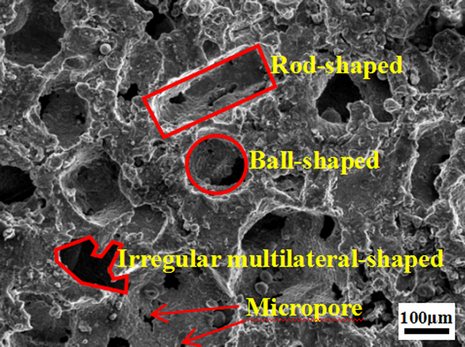Published online by Cambridge University Press: 23 June 2020

In this paper, CNTs reinforced foam aluminum matrix composites with small pore diameter were prepared by powder metallurgy method. When the mass fraction of CNTs was 0.75%, the tensile strength, flexural strength and compressive yield strength of the materials were 3.4 times, 2.4 times and 2.4 times of pure foam aluminum, respectively, reaching the maximum value, which obviously improved the mechanical properties of aluminum foam. The tensile property model of foam aluminum matrix composites was built to predict the properties of the composites, and the effects of defects and reinforcement on the mechanical properties of the composites were compared. The results show that the tensile fitting is consistent with the measured results when the mass fraction of CNTs is less than 0.75%, but the weakening effect of defects on the strength of aluminum foam is much greater than the enhancement of CNTs. With the increase of CNTs mass fraction, the damping loss factor of foam aluminum composites increases, dislocation damping and grain boundary damping play a role in advance, and the damping peak moves to the low temperature region.
These authors contributed equal
To send this article to your Kindle, first ensure no-reply@cambridge.org is added to your Approved Personal Document E-mail List under your Personal Document Settings on the Manage Your Content and Devices page of your Amazon account. Then enter the ‘name’ part of your Kindle email address below. Find out more about sending to your Kindle. Find out more about saving to your Kindle.
Note you can select to save to either the @free.kindle.com or @kindle.com variations. ‘@free.kindle.com’ emails are free but can only be saved to your device when it is connected to wi-fi. ‘@kindle.com’ emails can be delivered even when you are not connected to wi-fi, but note that service fees apply.
Find out more about the Kindle Personal Document Service.
To save this article to your Dropbox account, please select one or more formats and confirm that you agree to abide by our usage policies. If this is the first time you used this feature, you will be asked to authorise Cambridge Core to connect with your Dropbox account. Find out more about saving content to Dropbox.
To save this article to your Google Drive account, please select one or more formats and confirm that you agree to abide by our usage policies. If this is the first time you used this feature, you will be asked to authorise Cambridge Core to connect with your Google Drive account. Find out more about saving content to Google Drive.